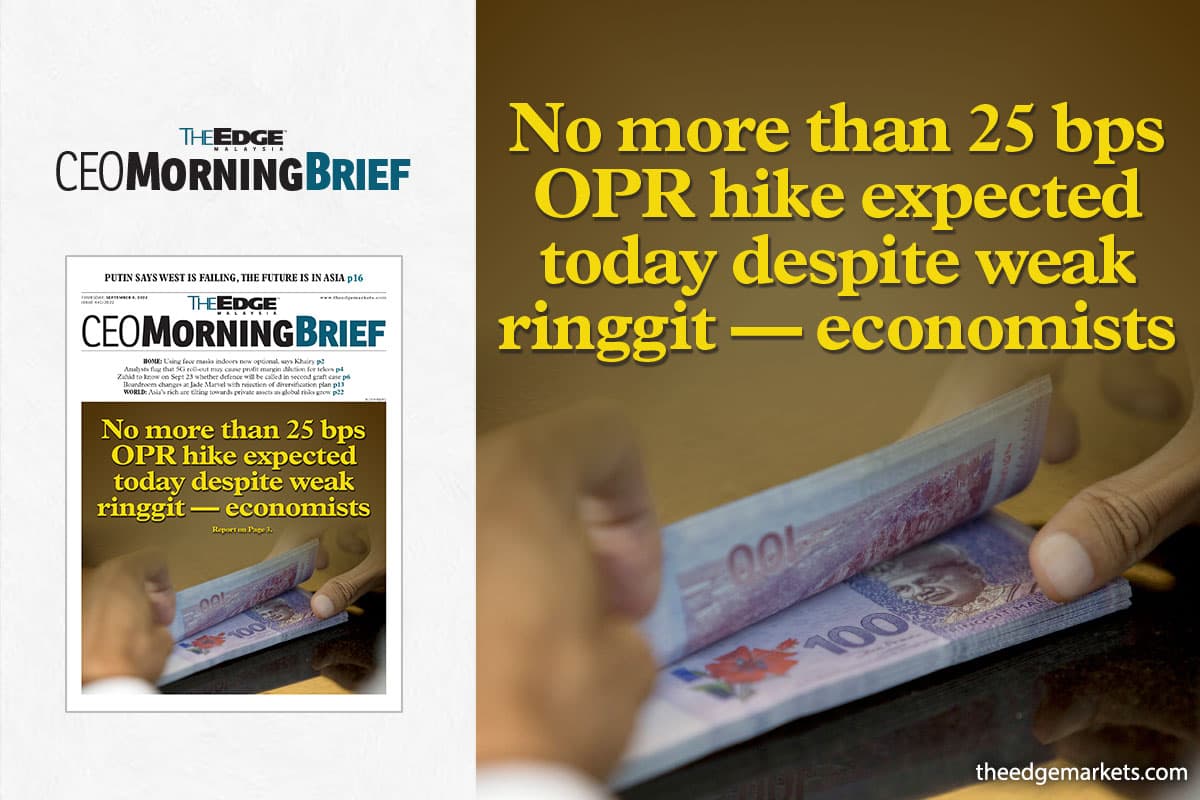
"I think the MPC meeting will consider a lot of factors, but it will be independent of what happened to the currency (ringgit), it’s not about raising rates to support the ringgit” — Lee Heng Guie, executive director of SERC
KUALA LUMPUR (Sept 8): Ahead of the release of Bank Negara Malaysia's (BNM) Monetary Policy Committee (MPC) statement on Thursday (Sept 8), the ringgit depreciated to a 24-year low against the US dollar. How would it affect the upcoming monetary policy?
Economists The Edge spoke to are of the view that the expected 25-basis-point (bps) hike in the Overnight Policy Rate (OPR) is to be independent of the local currency's movements, which opened at RM4.5010 — the lowest level against the greenback since the Asian financial crisis back in 1998 — before settling 0.1% weaker at RM4.5030.
Although the ringgit has slipped 8.08% year to date, major currencies have suffered greater losses — Japanese yen at 25.92%, British pound at 15.51%, and euro at 15.02%.
In the Southeast Asian markets, the Philippine peso weakened the most by 12.08%, while Thai baht was down 10.59%.
They opined that the MPC's decision would mainly take into consideration the continued growth of the domestic economy as well as the risk of inflationary pressures. The local note's shaky position against the greenback is not likely to influence the monetary policy stance.
MIDF Research economist Zafri Zulkeffeli, for one, said the weakening of the ringgit is no cause for concern, as it is not alone in this fiscal tightening environment.
"The macro numbers in the US are still good, so there could possibly be a higher rate hike of 75 bps by the US Fed (Federal Reserve) at the Sept 21 Federal Open Market Committee meeting. Previously we were expecting that [Fed] rate hikes would be slower and slower, but there is potential for it to be moving at a higher-than-expected size of increase," he said.
He noted that the MPC's fifth meeting of the year is likely to see another 25 bps hike — which would raise OPR to 2.5% — in view of the continued improvement in the domestic economy.
"The central bank will also be looking at inflationary pressures, in particular as core inflation hit 3.4% in July, the highest since March 2016 — this really reflects the strengthening of consumer spending," he said.
Malaysia's economy expanded 8.9% year-on-year in the second quarter of 2022 (2Q22), after recording 5% growth in 1Q22. BNM maintained its full-year gross domestic product growth projection at 5.3% to 6.3%.
Looking at the last MPC meeting in November, Zafri expects another hike of 25 bps to end the year at 2.75%.
Socio-Economic Research Centre (SERC) executive director Lee Heng Guie said a 25 bps hike is on the cards on Thursday given the strength of the Malaysian economy and inflationary pressures.
"This will take into consideration the strength of the economy, inflationary risks and assess whether there is a need for us to normalise interest rates from where we are as we are already on the road to recovery.
"I think the MPC meeting will consider a lot of factors, but it will be independent of what happened to the currency (ringgit), it's not about raising rates to support the ringgit," he explained.
Lee added that as the economy has recovered to a state better than during the Covid-19 pandemic, it is opportune for the central bank to gradually increase the OPR in the event of a potential downturn, such as a global recession, to allow for some space to cut rates in the future.
Contrary to MIDF's forecast, SERC's Lee sees no more rate hike in November.
In any case, he stressed that the central bank's decision should not be interpreted as defending the local currency.
"Capital will go to the country which offers higher returns. The reason why the US dollar continues to charge higher is because the US Fed has moved ahead of everyone [on interest rate], not just Malaysia," he said, adding this situation will continue until the time when the Fed's interest rate reaches its peak.
Malaysian Institute of Economic Research senior research fellow Dr Shankaran Nambiar said rate hikes may not be what Malaysia needs, but in a globalised world, Malaysia's interest rate cannot diverge too far from the US'.
"On top of that, the ringgit is sliding down. Clearly you don't want to exacerbate that trend."
To recap, BNM in May increased the OPR by 25 bps to 2% from a record low of 1.75% as global inflationary pressures increased sharply and after taking into account the sustained reopening of the global economy and improvement in labour markets.
The central bank then raised the key benchmark rate by another 25 bps to 2.25% in July.
While it is widely expected to see further hikes in the OPR, the pace of normalisation will be closely watched on the back of a potential economic slowdown, elevated inflationary pressures and a weak ringgit.
